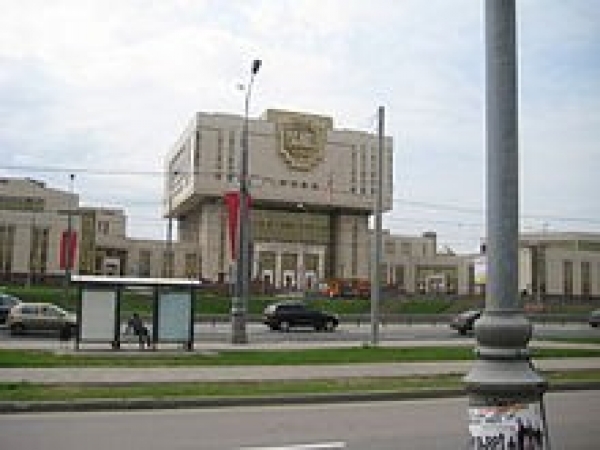http://www.msu.ru/
Description
Founded in 1930 as the biology section of the Faculty of Physics and Mathematics at Lomonosov Moscow State University, the Faculty of Biology, with its departments of zoology, botany and soil and geography, is a major center of learning and research, training specialists in various fields of biology.
Comprising 28 departments, the Faculty of Biology has 3 problem-dedicated laboratories (the laboratories of space biology and of fermentation chemistry, the laboratory for fisheries and aquatic ecosystems assessment and management), over 50 research laboratories at the departments, 4 faculty laboratories (the laboratories of electronic microscopy, experimental animals, sediment analysis, isotope analysis). We have active affiliations with a biological station in Zvenigorod and a marine station on the White Sea, the Muzeum of Zoology, the Botanical Gardens on Vorobiyevy Hills and Prospect Mira and a wildlife rehabilitation and research centre.
The Faculty main areas of research are major modern issues in biology, medicine and agriculture, with our scientists working on the following problems: physical and biochemical principles of self-organization in biological systems (material and energetic component relationships in complex biological systems); comparative physiology and biochemistry of microorganisms; protein and nucleic acids structure, synthesis and functions; genetic engineering on pro- and eukaryotic organisms; histogenesis of connective tissue cells; biological membrane structure and functions; energetic processes of photosynthesis, human and animal physiology (physiology of cardiovascular system and visceral systems, blood physiology); genetics; evolutionary and ecological physiology; the theoretical basis for modelling of biological systems.
The Faculty academics study the patterns of development in the organic world; the variety of living creatures on our planet and their evolution; usage, preservation and sustainability of bioresources; fauna and flora of various natural zones; productivity of various biocenoses; host/parasite interaction; population structure of plant and animal species; animal behavior; human population genetics; origins and structure of ethnic groups and nations, etc.
The Faculty of Biology offers a variety of 5-year Specialist’s Degree programs.
Our curricula include fundamental science courses and biological disciplines in various fields of biology. The basic biological disciplines include: zoology, botany, microbiology, evolution theory, biochemistry, molecular biology, genetics, human, animal and plant physiology, human anatomy, cytology, etc, the basic undergraduate training completed in the first three years. In their first and second year our students have their summer fieldwork courses at the affiliated biological stations and in Pushchino, where they study the variety of the natural world and acquire their experience in research work.
We offer a wide variety of specific fields in anthropology, zoology, botany, physiology, genetics, biochemistry, biophysics and microbiology for students to choose their major area from in their third year and to work on through the fourth and the fifth year.
Anthropology is taught by the Department of Anthropology that offers courses in anthropogenesis, ethnic anthropology, ethnography, archaeology and other related fields.
Zoology is taught jointly by the Departments of Zoology of Vertebrates, Zoology of Invertebrates, Entomology, Ichtiology and Biological Evolution, which offer courses in histology, embryology, animal ecology, zoogeography, applied entomology, animal selection, etc.
Courses in botany, including plant ecology, geobotany, plant developmental biology, the studies of flora in different parts of the world, plant selection, etc., are taught by the Departments of Higher Plants, Mycology and Algology, Geobotany and Hydrobiology.
Physiology is taught jointly by the Departments of Human and Animal Physiology, Embryology, Cell Biology and Histology, Higher Nerve Function, Plant Physiology and Physiology of Microorganisms, through the courses on brain morphology, endocrinology, cardiovascular physiology, energy metabolism, neurophysiology, neurochemistry, phyto-photo dosimetry, tumour cell biology, breeding biology, ecology and evolution of photosynthesis, etc.
The undergraduates at the Department of Genetics are offered courses in genetic analysis, mutagenesis, human genetics, genetics of microorganisms, molecular genetics and genetic engineering, population genetics, etc.
Biochemistry is taught jointly by the Departments of Biochemistry, Molecular Biology, Virology and Bioorganic Chemistry, giving courses on molecular biology, bioenergetics, immunochemistry, enzymology, genetic engineering, nucleic acid chemistry, biotechnology, physical and chemical methods in biology, etc.
Biophysics is taught jointly by the Departments of Biophysics and Bioengineering, through the courses on molecular biophysics, bioinformatics, physical chemistry, computer methods in molecular design, mathematical modeling of biological processes, quantum biophysics, cell biophysics, protein engineering and cell engineering, physical and chemical methods in biology, genetic engineering, molecular modeling, electronic and spectral methods for studies, radiobiology, methods of nuclear magnetic and electron paramagnetic resonance, laser spectroscopy, luminescent and absorbance spectro-photo dosimetry.
Courses on microbiology taught by the Department of Microbiology include vitamin and antibiotic biosynthesis, ecology and genetics of microorganisms, biotechnology, cultivation of microorganisms, physical and chemical methods in biology.
Our students gain practical experience in expeditions or during their work placements at various enterprises, test stations, research institutions and laboratories, nature and wildlife reserves where they may get employed upon graduation.
Specific details
University
Lomonosov Moscow State UniversityLocation
GSP-1, Leninskie Gory, Moscow, 119991, Russian Federation







 How to resolve AdBlock issue?
How to resolve AdBlock issue? 


Comments (0)